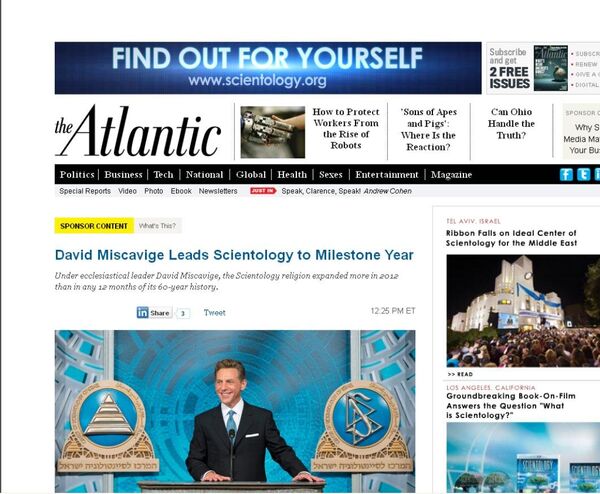WASHINGTON, January 15 (RIA Novosti) – Venerable US magazine The Atlantic has come under fire for publishing a web advertisement paid for by the controversial Church of Scientology, which has been widely criticized for its alleged cult-like practices.
The so-called “advertorial,” which resembled the publication’s own news content, was published on The Atlantic’s website around 12:30 p.m. (1730 GMT) Monday and lauded church leader David Miscavige for helping Scientology expand “to more than 10,000 churches, missions and affiliated groups, spanning 167 nations” in 2012.
But the advertising package quickly drew fire from readers, media commentators, and magazine staff, who accused The Atlantic of sullying its reputation by providing a promotional venue for Scientology, whose members include famous celebrities such as Hollywood star Tom Cruise.
Critics accuse the Church of Scientology of extracting exorbitant fees from members and bullying those who try to extricate themselves from the group, whose canonical texts have been deemed extremist in Russia.
The group says it promotes a legitimate religion and has aggressively pursued litigation against vocal critics of its practices.
The Atlantic pulled the promotional material from the site 11 hours after publishing the ad and issued an apology to readers.
“We screwed up,” Natalie Raabe, a spokeswoman for the magazine, said in a statement Tuesday. “It shouldn’t have taken a wave of constructive criticism—but it has—to alert us that we’ve made a mistake, possibly several mistakes.”
The outcry highlights the US print media’s tricky dance to remain financially viable as the Internet eats away at their advertising base.
“We now realize that as we explored new forms of digital advertising, we failed to update the policies that must govern the decisions we make along the way,” Raabe said.
“It’s safe to say that we are thinking a lot more about these policies after running this ad than we did beforehand. In the meantime, we have decided to withdraw the ad until we figure all of this out.”
The Atlantic, which was founded in 1857 and published the work of American literary giants like Mark Twain and Ralph Waldo Emerson during their lifetimes, was also pilloried by readers for removing negative comments posted under the advertorial throughout the day Monday.
The advertisement was labeled “Sponsor Content,” indicating that it had been paid for, but at a quick glance it was not immediately distinguishable from the magazine’s other news content.
Citing sources at The Atlantic, New York Magazine reported on its website that members of the publication’s editorial staff were “blindsided” by the ad and “livid” that it had been published.


